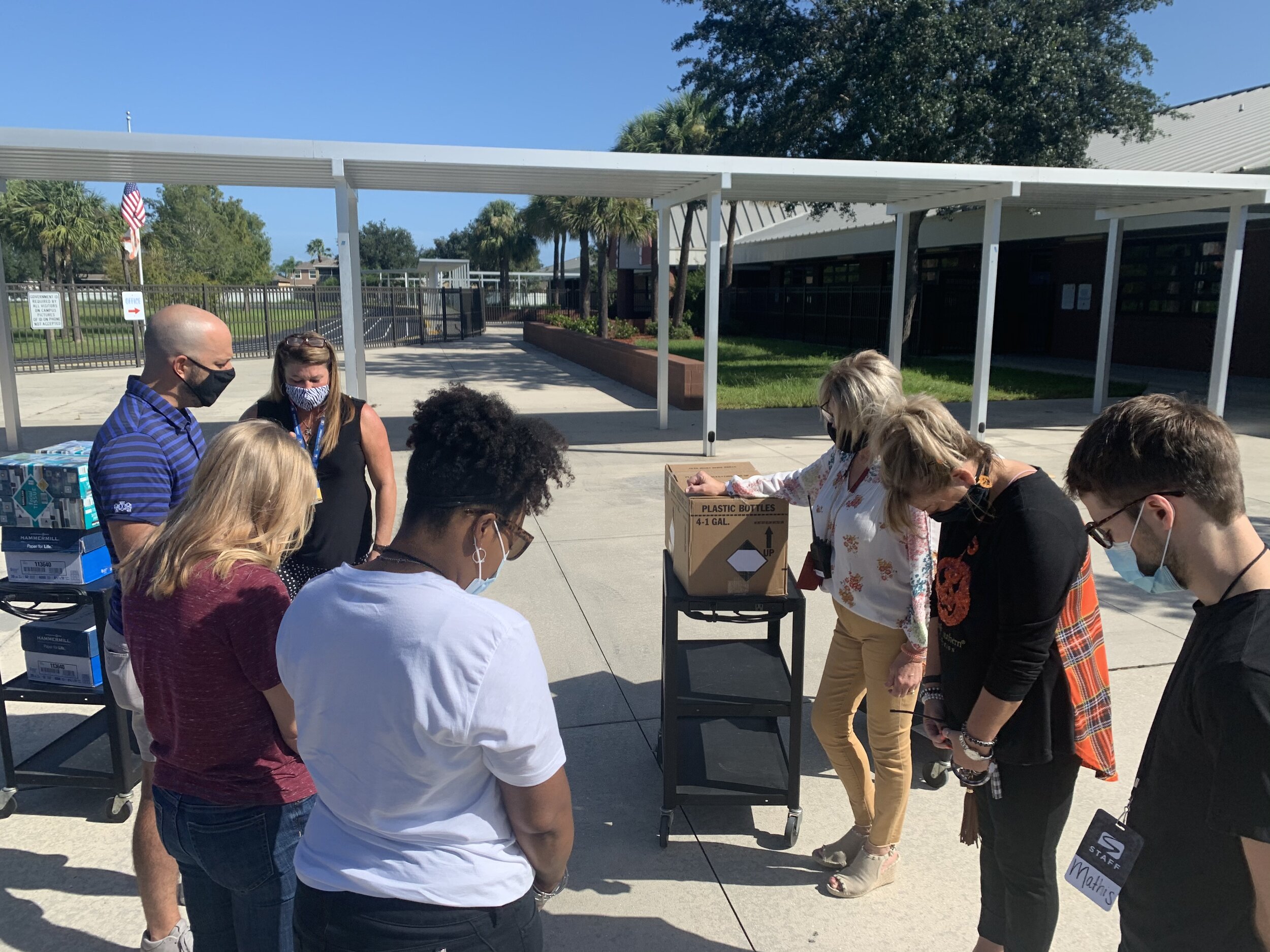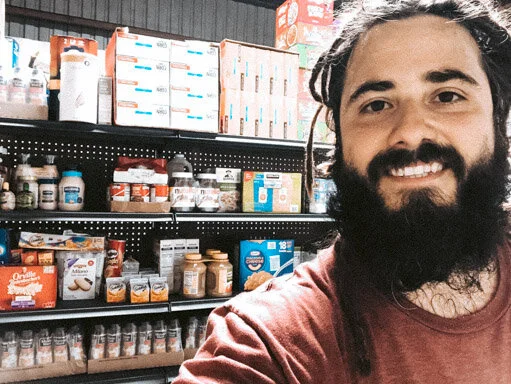
THE BREAD AND CUP OF CHRIST
By Michael Girado
The bread and the cup. Two symbols central to Christian faith and practice. Two symbols central to the life and community found in the body of Christ. These symbols represent the core of our beliefs––the life, death, and resurrection of Jesus Christ. But the bread and the cup are more than mere symbols. They are part of a sacrament or ordinance given to us by Christ himself, commonly referred to as The Lord’s Supper (Matt. 26:26-29, Mrk. 14:22-25, Luk. 22:14-20). It is a Christian rite or ritual accompanied by tangible elements meant to constitute something deep within the Christian experience. Within these two symbols are found the life-giving reality that binds the church together as one in Christ and empowers them to be grace-filled recipients who reflect life within the kingdom of God.
Over the last few months, we’ve been hindered from being able to come together to the Lord’s table. This season has hopefully created a longing in your heart to once again partake of the bread and the cup with the family of God. In his book, A Holy Meal, Gordon T. Smith helps us understand the Lord’s Supper and how it shapes life in the church. As we prepare to once again come to the table, we invite you to consider the depth of meaning found in this ordinance. Consider the fact that the bread and the cup are not mere symbols but are “the very means by which we participate in the intangible and spiritual realities without which there is no life” (Smith, pg. 24-25). As we understand its layered depth of meaning, we will more fully appreciate, enjoy, and be changed by this rich experience.
I. COMMUNION IS AN INVITATION TO REMEMBER
As Jesus celebrates Passover with his disciples in the upper room, he institutes this ordinance with the following words: “Do this in remembrance of me” (Mark. 14:19). As we come to the table as a family, we are first called to remember. But this act of remembrance is more than just a mere recollection of certain events or “sentimental nostalgia.” Authentic remembering is recalling the past so that it “instructs, informs, and encourages us to live in the present in light of the past” (Smith, pg. 37). The table is a call to remember how the life, death, and resurrection of Jesus Christ saves us and is continuing to transform us. It reminds us of our new identity as followers of Christ and now compels us to live in light of all that Christ has accomplished for us.
But most importantly, this act of remembrance allows us to uniquely experience the one whom we remember. As Smith recognizes, “The most significant thing that happens…is not that we do this work of remembrance. Rather, in our remembering, the crucified and risen Christ is in our midst” (pg. 39). The table is not a “memorial service” to honor someone who has died. The act of remembering is a mysterious opportunity to encounter the risen Savior. We must come to the table regularly in order to remember this ancient truth. This remembrance allows the reality of the gospel and the very presence of Christ to change how we live in the present.
II. COMMUNION IS AN INVITATION TO FELLOWSHIP
Not only is Jesus present at the table, but so is his body–the family of God. It may seem like an obvious observation, but Smith reminds us, “In the Lord’s Supper, we are not merely eating; we are eating together” (pg. 47). Communion was never meant to be an isolated or individualistic activity. We are to come to the table together as the family of God, and as we do so, we “simultaneously affirm our shared identity and cultivate our unity” (pg. 47). The gospel reminds us that we not only have peace with God but that we now have peace with one another (Eph. 2:14). Therefore, Communion “is always a meal of the community of faith...wherein we both declare and experience the grace that we are at peace with one another” (pg. 49).
In his letter to the Corinthians, we find the Apostle Paul correcting the church for neglecting this crucial aspect of the Lord’s Table (1 Cor. 11:17). The Corinthians had forgotten that Communion was a meal where the people of God were to come “together as a church” (1 Cor. 11:18). Instead, they were divided both physically and spiritually (v. 19) to the extent that Paul no longer considered the meal they celebrated to be the Lord’s Supper (v. 20). Paul’s response was two-fold. First, the Corinthians were to examine their lives for sin (v. 28), and secondly, they were to “wait for one another” (v. 33). The table challenges the individualistic and isolated culture of today’s world that we are tempted to embrace. The table reminds us that we are the family of God; sons and daughters adopted in love. And as the host of the meal, Christ empowers his children to live out this new reality in the world. We come together to this communal event and enjoy fellowship with Christ and with one another.
III. COMMUNION IS AN INVITATION TO HOPE
At the end of his words of institution, Jesus tells his disciples, “I will not drink again of this fruit of the vine until that day when I drink it new with you in my Father’s kingdom” (Matt. 26:29). Every time we come together to the table; we are reminded of Christ’s imminent return. Communion anticipates the marriage supper of the Lamb (Rev. 19) when we will feast with Christ and be fully satisfied in him. It is meant to create a longing for Christ and a desire for God’s kingdom to make all things new. Smith reminds us, “Each time we celebrate this special meal in the context of our worship…we declare…that evil, wrong, and pain do not have the last word. We eat together, yearning for another day; we eat knowing it is coming” (pg. 93-94).
With our eyes fixed on the future, communion also enables us to live in the present with enduring hope. We are proclaiming that we have been “born again to a living hope” and await “an inheritance that is imperishable, undefiled, and unfading” (1 Pet. 1:3-4). When we partake of the bread and wine, this hope is renewed afresh, and we are enabled to live with joy in a world of suffering and despair. We “rejoice with joy that is inexpressible and filled with glory” because the hope of Christ assures us that we will obtain the outcome of our faith (1 Pet. 1:8-9). Smith encourages us that when we celebrate communion, “Our present is invaded and infused by the future. The gospel arrives on our doorstep, and we are enabled to live with hope in a discouraging world (pg. 95).”
IV. COMMUNION IS AN INVITATION TO MISSION
The bread and the cup call the people of God to remember the gospel and the presence of Christ in our midst. It calls us to live within our shared identity as the family of God and cultivates our fellowship in Christ. It renews our hope and enables us to live with joy as we await Christ’s return. Communion then sends us back out into the world to live as a people who represent the gospel to every man, woman, and child. Although not explicitly stated, this reality is implied in Mark’s recording of the Lord’s Supper, as Jesus refers to it as the “blood of the covenant” (Mark 14:24). Those who partake of this meal are reminded that we are covenant people “called into a distinctive way of being in the world” (pg. 68). As a covenant people, we are “a chosen race, a royal priesthood, a holy nation,” that we may now “proclaim the excellencies” of the one who called us out of darkness (1 Pet. 2:9).
Jesus also tells his disciples that he will drink of the cup again with them “in the kingdom of God” (Mark 14:25). As we await that day, Smith remarks that “the Lord’s Supper reminds us that there are many who are yet at the table” (pg. 74). Mission should be the natural response for those who come to the table. Communion is meant to propel us back out into the world to proclaim the gospel and make disciples who will then enjoy the bread and the cup with us. Finally, Smith summarizes the invitation to the table as an event where “there is both the motivation and the grace to be all that we are called to be, to witness in word and deed to the very gospel that is portrayed in this meal. We move from table fellowship to the ministry of reconciliation” (pg. 75). This is the invitation of communion–to remember, to fellowship, to hope, and to mission.









































































